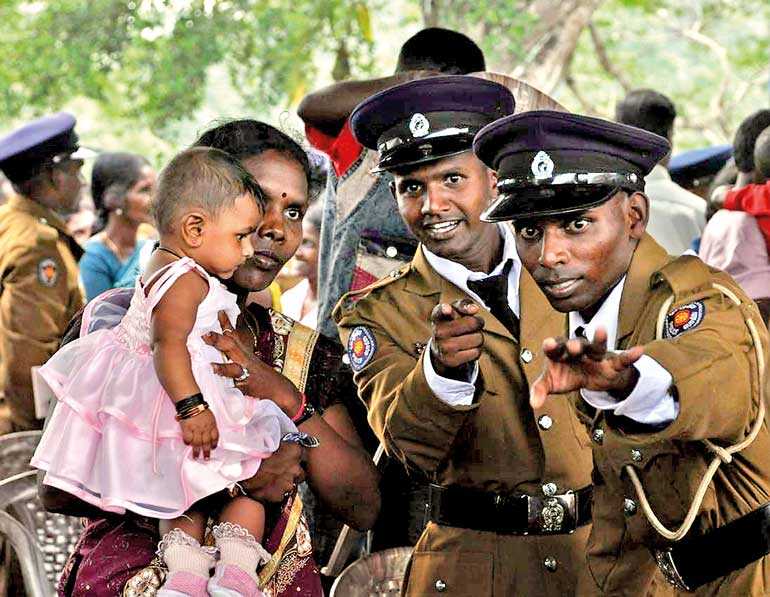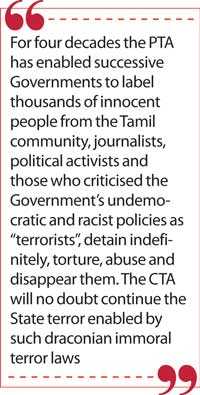Tuesday Feb 17, 2026
Tuesday Feb 17, 2026
Tuesday, 5 March 2019 01:23 - - {{hitsCtrl.values.hits}}

By Lakmali Hemachandra
and Swasthika Arulingam
A bill to abolish the Prevention of Terrorism Act of 1979 (PTA) and introduce a new law to address terrorism titled Counter Terrorism Act (CTA) Bill was tabled in Parliament on 9 October 2018.
One of the election promises of the Good Governance Government was to repeal the PTA. The PTA was criticised by many as a draconian law that created a parallel criminal justice system for the offence of ‘terrorism’, violating basic protections awarded to citizens in the general criminal justice system. Provisions relating to the admissibility of confessions as evidence, and the power of the Minister of Defence to issue detention orders, were generally accepted to be abusive.
The practical implication of the PTA meant that there would be widespread torture of those arrested under this Act, and prolonged detention without trial. The PTA was also specifically used against the Tamil community during the decades of the LTTE’s military confrontations with the Government, and even after the war ended in 2009.
The new CTA bill has been portrayed by several civil society experts and Members of the Parliament as an improvement from the existing PTA, mainly on account of the removal of the clause relating to the admissibility of confessions, and the use of “human rights jargon” in the Bill. This is either a deliberate lie, or a very unfortunate misconception of the CTA Bill.
History of the PTA
The PTA was passed as a Temporary Provisions Act in Parliament in 1979 for the expressed purpose of dealing with ‘terrorism’ and violence. However, it is also important to note that this Act was passed by the J.R. Jayawardene Government, in the context of a concentration of power in the Executive, liberalisation of the economy, and the entrenching of the unitary state in the Constitution.
There was mass disapproval of these policies of the Government in the south and the north. Many citizens were turning to acts of violence against the State in light of the gradual shrinking of democratic spaces, and the inability of democratic political forces to bring about change.
In 1980, months after passing the PTA, the July General Strike was brutally crushed. A few years later, the 1983 ethnic riots broke out, now widely known to have been a Government lead pogrom against the Tamil community.
Following the clampdown of democratic political activity a few years following the enactment of the PTA, the political environment of the country rapidly turned violent, resulting in the second JVP insurgency, and the militarisation of the Tamil struggle against an oppressive State.
The PTA, which consisted of 31 provisions spread across 10 pages, had draconian provisions to admit confessions as evidence, empower the Minister of Defence to issue detention orders, not allow judicial scrutiny of those detention orders, and impose restrictions on the freedom of expression. Since the enactment of the PTA in 1979, democratic political forces in the country have campaigned to repeal the PTA.
Is the CTA better than the PTA?
Even a cursory reading of the CTA Bill which consists of 100 provisions spread out in 86 pages shows that new Counter Terrorism Bill if enacted would be an even more dangerous law. CTA does not specifically refer to violent acts of terrorism and its definition is wide enough to include civilian democratic activity.
For example, the ‘obstruction to essential services’,with the intention of ‘wrongfully compelling the Government of Sri Lanka to do or abstain from doing any act,’ can be interpreted to include trade union activity as an offence of so called terrorism.
We have seen in the recent past, the President abusing his powers under the Essential Public Services Act of 1979 to clampdown on strike actions. Moreover, during the Meethotamulla garbage crisis, the disposal of garbage was declared an essential service to control the protests. Under the new terror law, all these democratic actions of strikes and protests can potentially be interpreted as ‘acts of terrorism’.
We have seen Cabinet Ministers publicly calling trade unions and the student movement terrorist organisations. Under the new law, these casual interpretations of terrorism can mean dangerous consequences, including erasing the difference between terrorism and democratic dissent.
The CTA is also deeply troubling becauseit widens the powers of the Executive to intervene in democratic civilian life and creates a shadow state where police officers, members of the armed forces, the minister and the president acquire an unprecedented level of authority and power.
Under the new bill any police officer or a member of the armed forces can arrest any individual on the mere suspicion of committing an offence under the act or on information provided. Sri Lankan police and armed forces are already tainted with torture and extra judicial killings and with the new powers vested under this law anybody and everybody can be interpreted as a suspect at the discretion of the police and the armed forces.
Police is also empowered to issue orders prohibiting meetings, rallies and marches and conduct extensive surveillance including accessing private information of citizens. The power to issue detention order is vested with any Deputy Inspector of Police.
The minister is given the power to proscribe organisations, issue prohibitions orders, and the president is vested with powers to declare curfew and call armed forces without declaring emergency which would effectively create a permanent state of terror and emergency.
Do we need a terror law?
This law is also brought in with a considerable level of fear mongering and blind adherence to international pressure which conveniently make everyone forget that there are no armed militant groups in the country post 2009.
Civil society pundits and MPs who support the bill claim that the drafting of the bill was closely monitored by the international community. What they fail to mention is that post 9/11, there is an imperial pressure led by the United States and European Union to legislate terror laws connecting every country to a global counter terror regime which does not serve any local purpose.
After a violent three decade long war in the country, which came to an even more violent end in 2009, the last thing Sri Lanka needs is stigmatising political activism with false terrorist charges.
Sri Lanka has already ratified all UN conventions on Terrorism and legislated enabling laws in the country. Therefore there is absolutely no need to bring a separate law with a wide definition, and wide powers to bloat the executive power. Sri Lanka does not need to take an example from the West, to create breeding grounds for terrorism by criminalising democratic dissent and political activism.
For four decades the PTA has enabled successive Governments to label thousands of innocent people from the Tamil community, journalists, political activists and those who criticised the Government’s undemocratic and racist policies as “terrorists”, detain indefinitely, torture, abuse and disappear them. The CTA will no doubt continue the State terror enabled by such draconian immoral terror laws.
We, as the people, should stand up to this attempt by our Governments to label us as “terrorists” and act with vigilance and fervour to claim and reclaim spaces for democratic dissent and our sovereign right to democratic governance.
(SwasthikaArulingam and Lakmali Hemachandra, Attorneys-at-Law, are members of the Liberation Movement, a collective of women fighting against all forms of oppression, emphasising the centrality of women’s liberation for any movement for democracy, freedom and liberation from oppressive structures.)